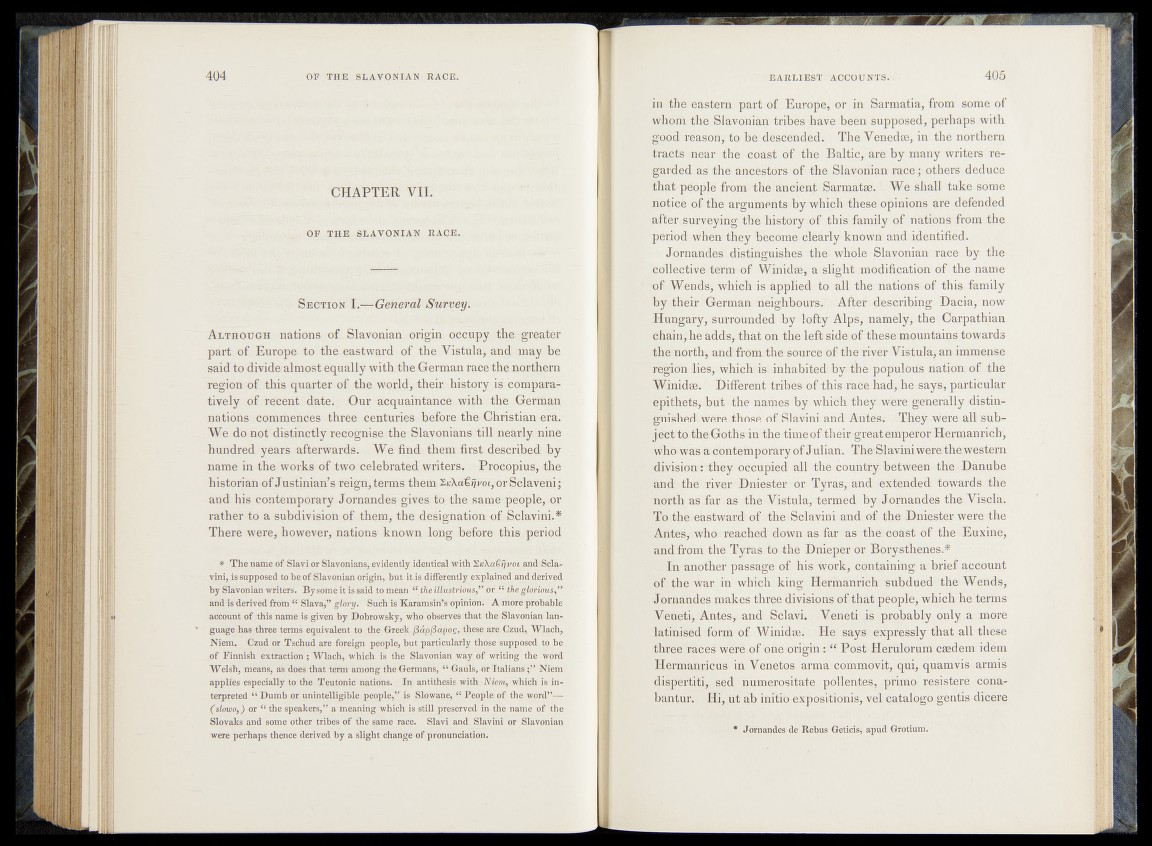
CHAPTER VII.
OF THE SL AVONIAN . RACE.
Section I.—General Survey.
Although nations ofL Slavonian origin occupy the-greater
part of Europe to the eastward of the Vistula, ,and\<mayahe
said to divide almost equally with the German race thenorthern
region of; this quarter of the world, theirrhigtory is comparatively
of recent date., Our acquaintance, with th e , GernS^fp
nations commences three centuries before the Christian era.
We do not distinctly recognise the- Slavonians itili nea-rlyftmine
hundred years afterwards. We find them first described by
name in the works of two celebrated writers. - Procopiusy the
historian of Justinian’s reign, terms them 2/cXa€^jÿot, orSclaveni;
and his contemporary Jornandes gives to the same people,’?pr
ra th e rto a subdivision of them, the designation of SelaVjni.*
There were, however, nations known long before-this period
* The same of Slavi or Slavonians, evidently identical with SicXa'Gfjvoi and Scla-
yini, is supposed to be of Slavonian origin, but it is differently explained , and derived
by Slavonian writers. By some it is said to mean “ th e illu s tr io u s ,” o r “ th e g lo r io u s ,”
and is derived from“ Slava,” glory. Such is Karamsin’s opinion. A more probable
account of this name is given by Dobrowsky, who observes that the Slavonian language
has three terms equivalent to the Greek f}apj3apoG, these are Czud, Wlach,
Niem. Czudor Tschud are foreign people, but particularly those supposed to be
of Finnish extraction; Wlach, which is the Slavonian way of writing the word
Welsh, means, as does that tenn among the Germans, “ Gauls, or I ta lia n sN iem
applies especially to the Teutonic natidns. In antithesis with;'Miem,. which is interpreted
“ Dumb or unintelligible people,” is Slowane, “ People of the word”—
(slmoo,) or “ the speakers,” a meaning which is stiU. preserved in the name of the
Slovaks and some other tribes of the saihe race. Slavi and, Slavini or Slavonian
ware perhaps thence derived by a slight change of pronunciation.
in th^earstetH part of Europe# or in Sarmatia, from some of
whom the Slavonian tribes;have bPeni supposed, perhaps with
■goodfreason^4© be^deappmig^k The-Venedae, in the northern
■tracts-n^pr t®§.eua>t,0,f the Baltic,i^reby many writers re-
garded as the ancestors of the Slavonian race; others deduGh
that people' from^'the ancien^^armataa'. We shall take some
ip'oticl-pf the arguments by which these'opinions are defended
[after .suryeyin’gftbfe history4d$Thfsi family natrons from the
Iperiodi w h eh fet^l^ ^^ ^id d ed rly known dsi^Mentifiedi,< n
Jornarldes difetinguish^'dlleji whole’ SlaVdnian,?race,;by the-
fedlleetive term of Winid|ri|$a slight! modification^ of> thename
»of Wendflf which is applied to all. thei«iatidns» of thisTamily
p y.their German neighbours'..' h AfifeijJ^s^ibing. Dacia, now
Hungary# su^roundfed; bytlofty Alps;.namely,>the ■?Carpathian
f@bain,h© adds^tiblt on the left'sidesdf these mountains .towards
thdfiaortb; a>nd“from!th^S‘oureb®f th c rimP Vistula# an .immense
legion lies1, whichkis« inhabited.by the populous nation o f the
Winidse.' differ Out tribes ©fithisrace had, bes&ys', particular
epithets, but- the namesaby ;iwh<ich thejl^ere.yg^erally- distin-
guished;^eYeTtt<|g;tf of, Slavini .and Antes.! They&Were all; subje
c t to the Gbths; in the timedf tfieiRgr-ektenperor Hermanrich,
who washiSCOhtemporary of Julian. TheSfavini were the^wpst^rn
division-rtbeyroccupied $11 the.eountfy^betweeii^the ■ Danube
and the? river Dniester ■ b r ’Tyras; and. extended towards rthe.
no*rth as far.as ;the Vistula, termed>hyi Jornandes the Viscla.
To the;eastward ofiithe;S,clavini and» of the iDniester were the
Antes, who-, reached'down as Tar saS theicoast of the Euxine,
and from the Tyras to -the Dnieper or Borysthenes.*
In another passage-of- his work, eontaimn^; a brief account
of. the war in whtfch king; HermanrichvsUbdued* the Wends,
Jornandes makes three divisions\@f tliat^|pp.l4;which he terms
Veneti, Antes, andpsSclavi.-^Veneti is probably only a more
latinised form of Winid;®;j He says expressly that all these
threeraees were of one’wigin-: “ Post Herulorum caedem iderg
Hermanricus in Venetos arma-comrnovit, qui, quamvis armis
dispertiti, sed numerositate pollentes, primo ^qsistere'.cpna-
bantur:. Hi, ut ab initio expositionis, vel catalogo gentis dicere
• Jornandes de Rebus Geticis, apud Grotium.